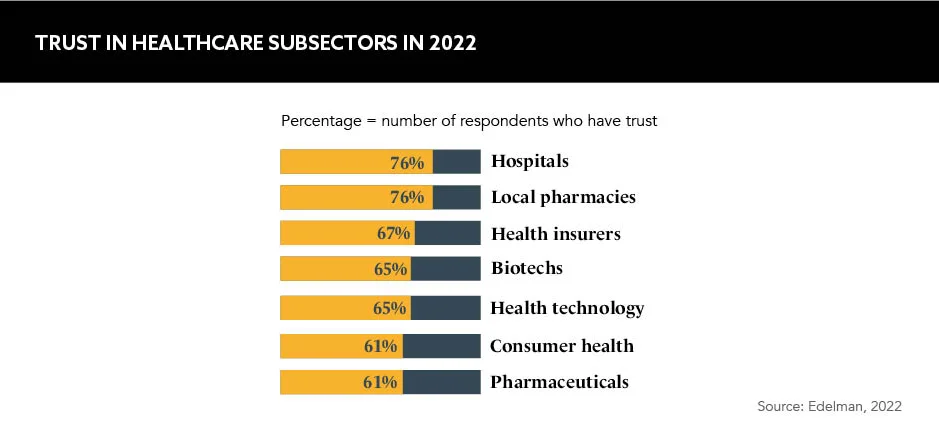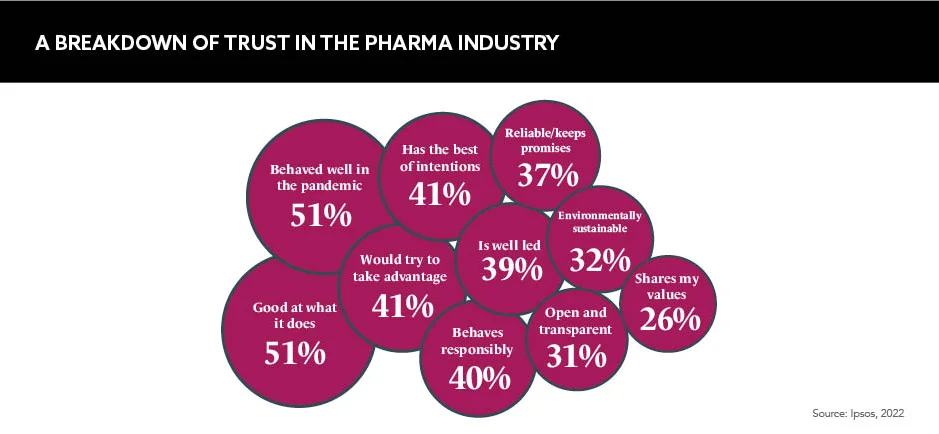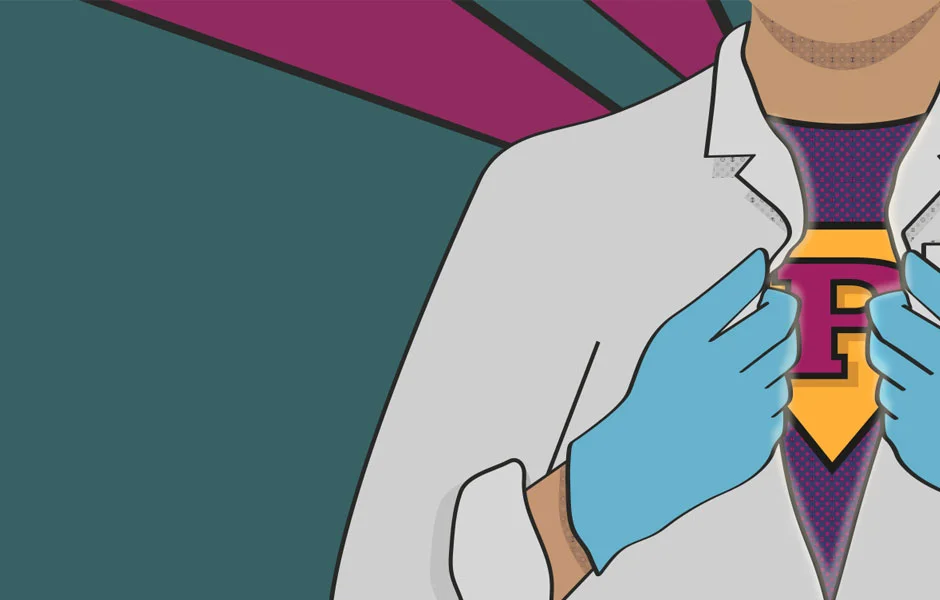The pharmaceutical industry is a rich source of material for the small screen, but why is it framed as the perpetual bad boy?
Words by Isabel O’Brien
Whether the trope is profits, price hikes or manipulative marketing models, the pharmaceutical industry has long fallen victim to villainisation in popular culture.
A perpetual punching bag for screenwriters and news editors alike, even developing a solution to COVID-19 has failed to rework the narrative to a necessary degree.
According to a 2022 report by Ipsos, pharma remains one of the least trusted sub-sectors of healthcare. In fact, the report found that 41% of people believe that the pharma industry would take advantage of them if they could.
It’s a fair to assume that most people in the industry believe their mission is to save patients’ lives through science. But clearly, this message is struggling to spread beyond the confines of the pharma echo chamber.
Bad news sells
It is widely accepted that bad news sells. Nevertheless, pinning pharma’s bad boy reputation on this theory alone is tricky. “This is what newspaper editors thrive on, but I would argue that positive stories also sell,” says Paul Simms, CEO, Impatient Health. “So, while this conclusion is easy to make, I think it’s a lazy get-out clause.”
The industry only needs to look at popular culture portrayals of healthcare to see that the issue is not so simple. From the long-running US medical drama Grey’s Anatomy to the BBC’s recent offering This is Going to Hurt about the NHS, audiences regularly tune in to enjoy representations of healthcare professionals as heroes. Evidence of their popularity lies in the 2021 viewing figures for Grey’s Anatomy. Even after 20 seasons, the show is the fourth most popular in the US and pulls in 6.67 million weekly viewers as of January 2022.
Clearly, there are other factors than just a public penchant for drama and devastation, otherwise why would two industries that share the same goal of saving patients’ lives be perceived and represented so differently in popular culture.
A lack of transparency
In 2021, the streaming world witnessed a burst of new shows being launched about the industry. From Dopesick to The Dropout, tales of pharma’s dark side have been selling, and these narratives have a key point of commonality.
Alongside being timely and important pieces of television, they offer viewers the chance to peek behind the facade of one of the world’s most opaque and complex industries. “People are not necessarily very close to the industry, and they do not have a really detailed knowledge about it,” says Thomas Fife-Schaw, Research Director, Ipsos UK. “So, their views are shaped by a whole range of things, including these popular representations.”
While the public interacts with healthcare systems and healthcare professionals at regular intervals throughout their lives, an apparent lack of visibility of the pharma sector obscures how the industry works, as well as its principles. This creates ample opportunity for popular culture to swoop in and capitalise, leading to an often-skewed narrative.
“People don’t understand the industry, so there’s the opportunity to satisfy curiosity with a telling ‘reveal’, even if unrealistic,” Simms reasons. “And because of previous experiences they assume it’s an unethical or shady place that is obsessed with financial gain over human health.”
People don’t understand the industry, so there’s the opportunity to satisfy curiosity with a telling ‘reveal’
The industry only has to look at the contrasting perceptions of patients to see how greater transparency could enhance its reputation. A 2022 survey by PatientView of patient advocacy groups revealed that 59% of respondents described pharma’s corporate reputation as “excellent” or “good”, suggesting that the more people know about its innerworkings and motivations the better.
Nonetheless, the historic lack of transparency provides fertile ground for storytellers to control public perceptions of industry. While the sector cannot deny that it has made significant failings in the past, it has also lacked a mode by which to share its more positive attributes and achievements with the public.
The pandemic peak
This all changed when the COVID-19 pandemic hit. The industry was thrust from the shadows into the media spotlight, and it gained an unprecedented platform on news channels globally. This not only showcased its dedication to finding protective solutions and a cure for COVID-19, but also the people and processes behind the pharma corporate engine.
“For the first time, people understood the phases within clinical trials, met the CEOs of pharma companies who were put on TV screens and saw the rigour required to get a medicine to market,” says Simms. “Simply understanding is often believing.”
Indeed, companies such as Pfizer, BioNTech, Moderna and AstraZeneca became household names and conversations on the complex DNA sequencing method mRNA were being had between everyday people.
“Despite lots of public debate about the efficacy of, and need for, vaccines and boosters, there is ample evidence of a very strong correlation between the approval of COVID vaccines and overall industry reputation,” notes Hensley Evans, Principal, ZS Associates.
Instead of the public focusing on the previous perceptions of the industry, a new chapter unfolded. “People were able to see past ‘reputation’ – because they recognised the good pharma was doing for humanity,” says Claire Gillis, CEO, VMLY&R Health.
When the vaccines were being researched and developed, the pandemic was the top global worry for citizens
However, ever since vaccine approvals rolled in and vials rolled out to the world’s population, pharma’s shining moment in the spotlight has been in jeopardy.
“When the vaccines were being researched and developed, the pandemic was the top global worry for citizens,” affirms Fife-Schaw. “That focus on pharma as a singular story; about its work and innovation, is now no longer ever present in public discourse, and certainly not in media coverage.”
The pandemic was a watershed moment for the sector, but it was just that: a moment. Now the industry must identify new avenues to sustain public trust in the long term and earn themselves a positive rather than villainous representation in popular culture.

A plan of action
If you can’t beat them, join them. While the industry invests millions each year into marketing campaigns, disease awareness drives and other initiatives, there is a lack of zeal to use its financial muscle and the power of storytelling to highlight its mission to end disease and compete with the negative representations offered by the mainstream media. And yet there is so much potential.
“Better storytelling is generally needed within our industry,” urges Simms. “We have to bring patient stories to life; we have to de-corporate our brands in order to become more human and we have to tell the stories of the scientists who made discoveries in a more compelling way.”
Companies can look to Pfizer’s 2021 ‘Mission Possible’ film for inspiration, which takes viewers behind the scenes on its journey to create the first approved COVID-19 vaccine. Produced in collaboration with National Geographic, the documentary reveals the human face of pharma and proves the industry is capable of creating engaging narratives around its activities.
Creating credibility
While collaborations are one way of winning trust from viewers, constructing stories that are both nuanced and authentic is just as important. Representations may currently be one sided, but the industry must not fall into the trap of biased storytelling themselves. There’s a lot of work to be done to balance the narrative.
Better storytelling is generally needed within our industry
“We already know how to do this in our personal life: be real,” clarifies Simms. “If I presented a ‘perfect’ exterior the whole time, with no depth or real personality, I’d find it hard to [form] relationships of any type. We already know how to do it; we just have to bring it to work.” For example, an industry-led telling of the events of the opioid crisis could be very impactful, yet currently companies are afraid to tell their side of the story.
As Fife-Schaw rightly notes: “There is no smoke without fire.” If the industry can publicly put its hands up and create its own balanced representations, it will win over many more than if it keeps cautiously treading the party line.
Can’t convince them all
There is plenty to feel hopeful about in pharma’s mission to improve its public reputation, but the industry must accept that not everyone’s perceptions will be easy to change.
Since reputation polls first began, public opinion has placed doctors and scientists on a pedestal, but business leaders have consistently lagged at the bottom with scathing scores. Therefore, it’s no surprise that when medicine and science become entwined with capitalism and profit, divisions emerge in how these activities are perceived by and represented to the public.
“What’s needed is a better, clearer and more persuasive argument of value that comes from activities, and how profits are put back into R&D,” offers Fife-Schaw. Many people have concerns about the profits that pharma generates, he adds, but they currently have no real concept of what they deem to be an “acceptable” level.
Is pharma brave enough?
The industry is already aware that the values of individuals are difficult to influence through their work to change prescribing behaviours and impact adherence. However, a steep incline should not deter the sector from reclaiming the reputational momentum it picked up during the pandemic – both in people’s minds and in popular culture.
“Ultimately, COVID disrupted health and it positively disrupted pharma,” concludes Gillis. “We have the opportunity to carry on disrupting – if we’re brave enough. Let’s not slip back into traditional thinking.”
Past negativity, a lack of transparency and securing a more positive place in popular culture are all barriers to improving pharma’s reputation, but the pandemic has shown that the public is receptive to change. It’s time for pharma to rewrite the script of its own reputation.







